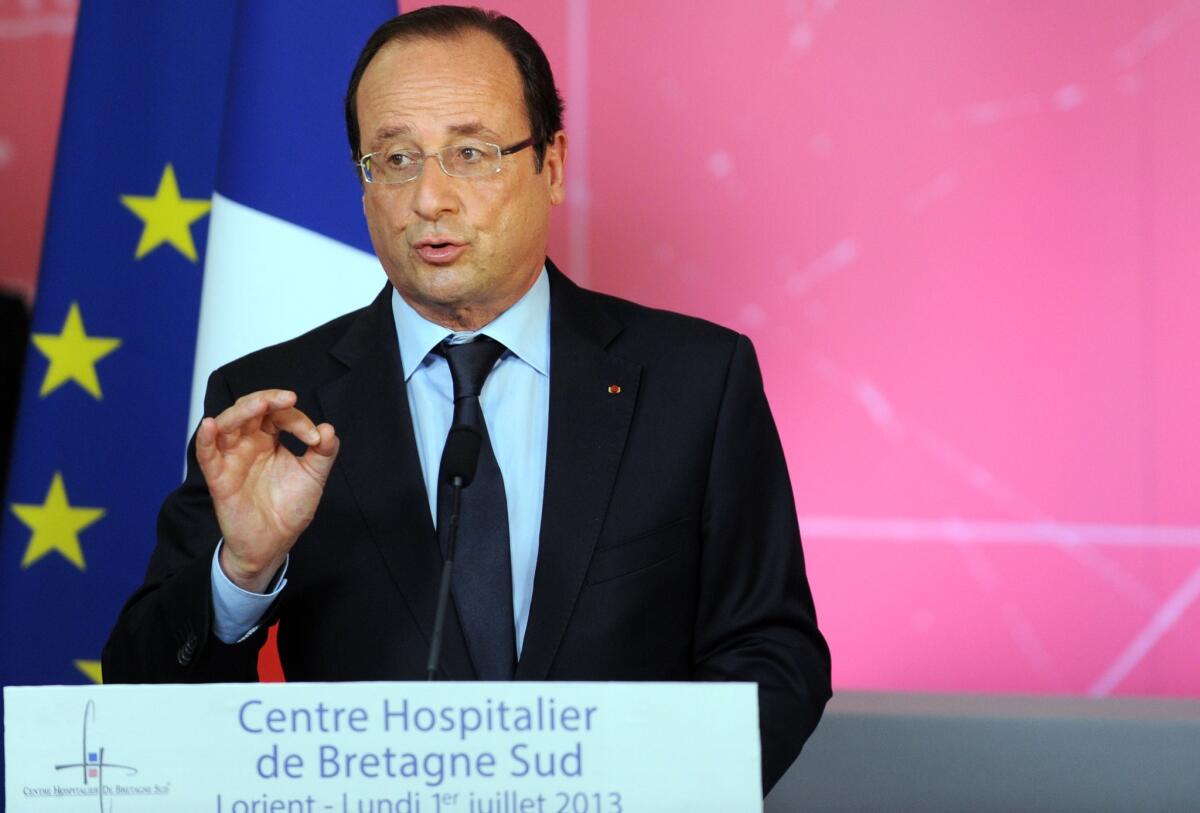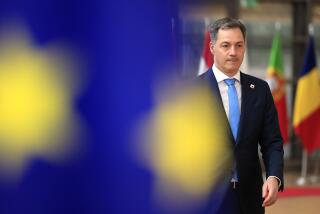European leaders angered by U.S. spying reports

LONDON â Europe turned up the pressure on the Obama administration Monday to respond to new allegations that the U.S. bugged the embassies of some of its long-standing allies and eavesdropped on European Union diplomats around the world.
Leaders and officials of EU countries said that, if true, the reports of American spying on friendly nations were unacceptable and potentially damaging to relations across the Atlantic and to joint endeavors such as upcoming talks on a U.S.-EU free trade pact.
âWe cannot accept this kind of behavior from partners and allies,â French President Francois Hollande said on television Monday.
A spokesman for German Chancellor Angela Merkel was equally blunt, saying, âWeâre not in the Cold War anymore.â
The allegations appeared in Germanyâs Der Spiegel magazine and Britainâs Guardian newspaper, both of which said the eavesdropping operation was revealed in documents leaked by Edward Snowden, the fugitive American believed to be in diplomatic limbo at a Moscow airport.
The Guardian said that one document listed 38 foreign diplomatic missions as targets for electronic espionage, including such U.S. allies as Japan, Mexico, France and Italy. One operation, code-named Dropmire, allegedly involved planting a bug in an encrypted fax machine used by the EUâs mission in Washington.
Citing secret documents it had âpartly seen,â Der Spiegel said that the U.S. National Security Agency also tapped European Union offices at the United Nations and in Brussels, where summits of EU leaders are regularly held.
The new allegations add to the concern that many European leaders have already expressed over the alleged collection of mountains of data on the emails and phone calls of millions of their citizens by American intelligence agencies. Privacy laws are generally more stringent in Europe than in the U.S. Germany in particular, where bitter memories of widespread informing and spying in the former East Germany are still fresh, has responded to allegations of U.S. surveillance with outrage.
âClarity and transparency is what we expect from partners and allies, and this is what we expect from the U.S.,â the European Commission said in a statement Monday.
Some analysts dismiss such indignation as hypocritical, saying that all governments, including those professing shock over the latest accusations, routinely spy on both friends and enemies to protect their interests.
âI guarantee you that in European capitals, there are people who are interested in, if not what I had for breakfast, at least what my talking points might be should I end up meeting with their leaders,â President Obama said at a news conference shortly after arriving in Tanzania on Monday. âThatâs how intelligence services operate.â
It is unclear how much harm will truly be done to transatlantic relations, even if the allegations prove true. Although France has signaled that the revelations could negatively affect talks on free trade, which Paris is tepid about anyway, other countries such as Britain and Germany are eager to move forward on such an accord.
The first round of negotiations is to take place in Washington this month.
ALSO:
The Week Ahead: EU inducts Croatia, U.S. sanctions hit Iran
Pro-democracy protest in Hong Kong draws tens of thousands
Egyptâs military gives President Morsi 48 hours to resolve crisis
More to Read
Sign up for Essential California
The most important California stories and recommendations in your inbox every morning.
You may occasionally receive promotional content from the Los Angeles Times.











